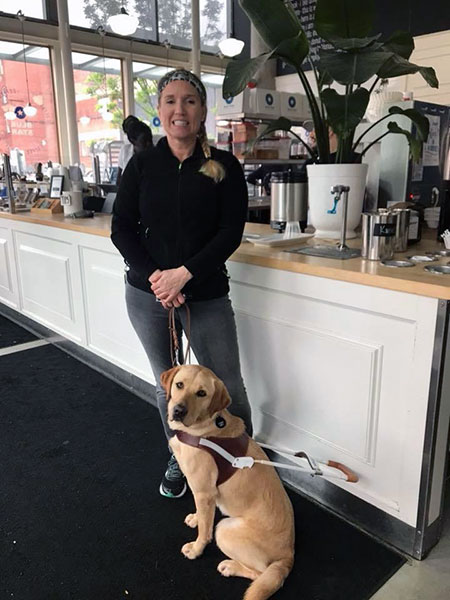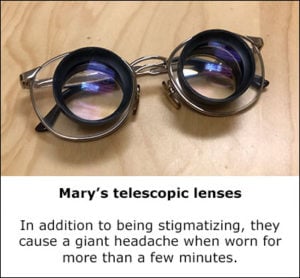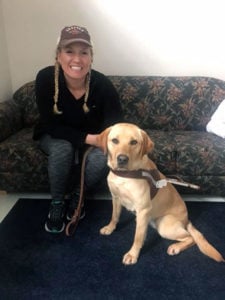Written by Mary Nestle-Klyn, Residential Administrator of Cascade Connections
 In honor of International Assistance Dog Week, I would like to share with you some information about my guide dog, Yuma. I got Yuma from Guide Dogs for the Blind (GDB) in May, 2018. Having a service dog has been absolutely life-changing! Yuma helps me with mobility, avoiding obstacles, navigating through crowds, etc. My eye condition affects my central vision, so often people and objects appear out of nowhere. Yuma has helped me to feel a sense of independence that I was quite honestly losing. Instead of relying on people for rides all of the time, Yuma and I are exploring public transportation together and becoming good at getting around Whatcom County! Previously I had to rely on sighted guides, a cane, or driving with my telescopic lenses, which, while legal, didn’t feel very safe.
In honor of International Assistance Dog Week, I would like to share with you some information about my guide dog, Yuma. I got Yuma from Guide Dogs for the Blind (GDB) in May, 2018. Having a service dog has been absolutely life-changing! Yuma helps me with mobility, avoiding obstacles, navigating through crowds, etc. My eye condition affects my central vision, so often people and objects appear out of nowhere. Yuma has helped me to feel a sense of independence that I was quite honestly losing. Instead of relying on people for rides all of the time, Yuma and I are exploring public transportation together and becoming good at getting around Whatcom County! Previously I had to rely on sighted guides, a cane, or driving with my telescopic lenses, which, while legal, didn’t feel very safe.
 One of the challenges of having a service dog is that strangers want to pet her all of the time. Always ask before petting a service dog. It could be dangerous to distract an assistance dog from their responsibilities.
One of the challenges of having a service dog is that strangers want to pet her all of the time. Always ask before petting a service dog. It could be dangerous to distract an assistance dog from their responsibilities.
Other dogs are also a barrier to success in the community. Yuma loves dog friends, but frequently we are confronted in the community by strangers with dogs that are not on leash who jump all over us and distract Yuma from her work. This is a frequent complaint I hear from my peers who also have service dogs.
 One of the ways Yuma assists me is that every morning when I get to work she leads me directly to wherever I have left my coffee cup and then directly to the kitchen to fill it up. It’s pretty funny. She relies on routine and has apparently figured mine out quite well!
One of the ways Yuma assists me is that every morning when I get to work she leads me directly to wherever I have left my coffee cup and then directly to the kitchen to fill it up. It’s pretty funny. She relies on routine and has apparently figured mine out quite well!
Do remember that visual impairment falls on a continuum. I stayed in Oregon for a couple of weeks taking classes with GDB on how to become an effective team with my guide dog. I was surprised that my eye sight was not the best amongst my group. Most people with visual impairments are not completely blind, but still benefit from the assistance of a guide dog. There are a lot of myths perpetuated by the media in regards to people with visual impairments looking stereotypically “blind.”
It’s important to realize that service dogs get to have fun too. People for the Ethical Treatment of Animals (PETA) is actually very against service dogs because they don’t understand that guide dogs are in fact not always working. People ask me all of the time if Yuma ever gets to be a normal dog. Yes, she does. She is like any other dog when she is off-duty.
 Generally speaking, I think Yuma really enjoys working. She loves having a sense of purpose and gets excited to be in her harness. She loves playing in her off time as well. If there comes a time that Yuma is no longer excited about working, she will retire and I will get a new dog. Guide dogs work for as long, or as little, of a time as they want to. Many dogs never make it to the status of guide dog. There is a great movie coming out that I have had the opportunity to preview called “Pick of the Litter,” which chronicles the life and challenges of puppy raisers upbringing of a litter for GDB.
Generally speaking, I think Yuma really enjoys working. She loves having a sense of purpose and gets excited to be in her harness. She loves playing in her off time as well. If there comes a time that Yuma is no longer excited about working, she will retire and I will get a new dog. Guide dogs work for as long, or as little, of a time as they want to. Many dogs never make it to the status of guide dog. There is a great movie coming out that I have had the opportunity to preview called “Pick of the Litter,” which chronicles the life and challenges of puppy raisers upbringing of a litter for GDB.
It is also important to remember that like humans, guide dogs have good days and bad days. Yuma is not super human, and she doesn’t actually speak English. She is trained to perform certain activities on my behalf with detailed rewards system. We are still a new team and working together to become an even better team.
Here is a video of Yuma having fun when she is off-duty!
